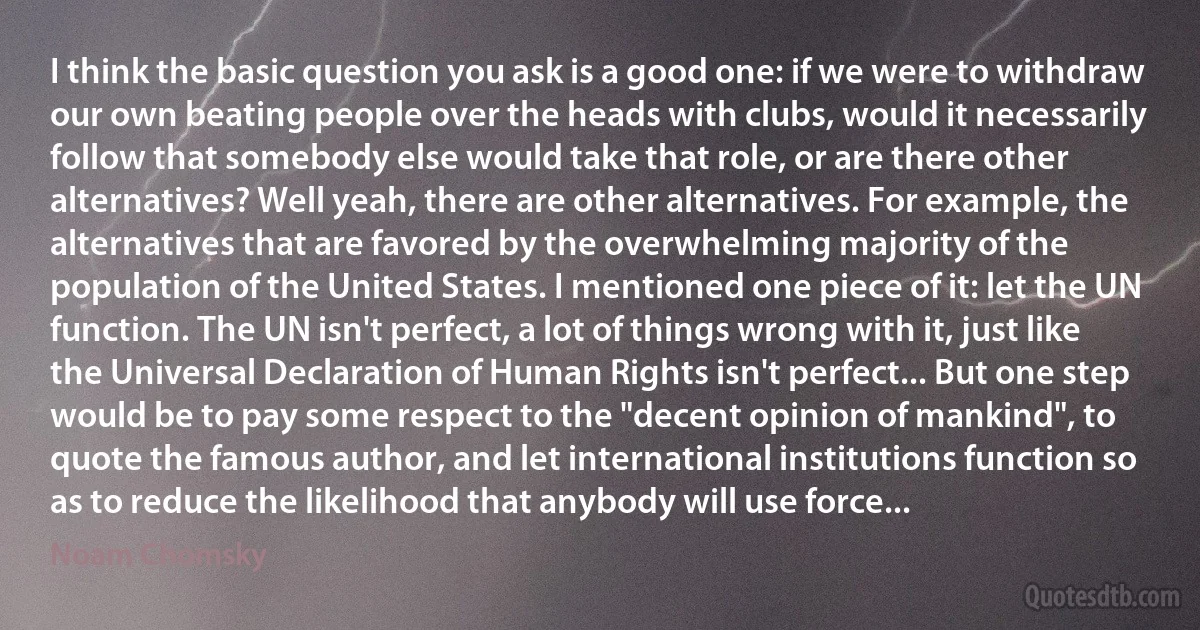Question Quotes - page 95
Experimenters are the shocktroops of science... An experiment is a question which science poses to Nature, and a measurement is the recording of Nature's answer. But before an experiment can be performed, it must be planned – the question to nature must be formulated before being posed. Before the result of a measurement can be used, it must be interpreted – Nature's answer must be understood properly. These two tasks are those of theorists, who find himself always more and more dependent on the tools of abstract mathematics.

Max Planck
To Be or Not to Be: In Nature all life is a question of the minutest, but extremely precisely graduated differences in the particular thermal motion within every single body, which continually changes in rhythm with the processes of pulsation. This unique law, which manifests itself throughout Nature's vastness and unity and expresses itself in every creature and organism, is the ' law of ceaseless cycles' that in every organism is linked to a certain time span and a particular tempo. The slightest disturbance of this harmony can lead to the most disastrous consequences for the major life forms. In order to preserve this state of equilibrium, it is vital that the characteristic inner temperature of each of the millions of micro-organisms contained in the macro-organisms be maintained.

Viktor Schauberger
General disarmament being for the present entirely out of question, a proportionate reduction might be recommended. The safety of any country and of the world's commerce depending not on the absolute, but relative amount of war material, this would be evidently the first reasonable step to take towards universal economy and peace. But it would be a hopeless task to establish an equitable basis of adjustment. Population, naval strength, force of army, commercial importance, water-power, or any other natural resource, actual or prospective, are equally unsatisfactory standards to consider.

Nikola Tesla
When I understood the task, it was not with a resolve such as men often make. With me it was a sacred vow, a question of life and death. I knew that I would perish if I failed. Now I felt that the battle was won. Back in the deep recesses of the brain was the solution, but I could net yet give it outward expression.

Nikola Tesla
Mutual understanding would be immensely facilitated by the use of one universal tongue. But which shall it be, is the great question. At present it looks as if the English might be adopted as such, though it must be admitted that it is not the most suitable. Each language, of course, excels in some feature.... A practical answer to that momentous question must perforce be found in times to come, for it is manifest that by adopting one common language the onward march of man would be prodigiously quickened. I do not believe that an artificial concoction, like Volapuk, will ever find universal acceptance, however time-saving it might be. That would be contrary to human nature. Languages have grown into our hearts.

Nikola Tesla
A lot of sophistication has been developed about the utilization of machines for complex purposes, and it doesn't make sense not to use it if you can think of a good question to ask. Playing chess is about the dumbest question you can ask. But, if you want, maybe can make money that way, or something. In fact, what's going on with the chess is about as interesting as the fact that a front-end loader can lift more than an Olympics champion, weight lifter, or something. Probably so, but, you know, these are just not serious questions.

Noam Chomsky
The crucial question for us is not whether they have a theocratic government. I'd personally prefer not, but I can think of a lot of places where I'd prefer not, like here. But, the question is whether the US will agree to let Iraq alone. That means to make it very clean and explicit, both in word and in action, that the US will withdraw, set a timetable for it, will not influence what goes on in Iraq, will not leave military bases, will let the country go off on its own. I think we also ought to pay massive reparations, but I'll stop short of that. Those are the crucial issues. It's not up to Rumsfeld what kind of government they have, it's up to him to get out.

Noam Chomsky
I'm of course opposed to terror, any rational person is, but I think that if we're serious about the question of terror and serious about the question of violence we have to recognize that it is a tactical and hence moral matter. Incidentally, tactical issues are basically moral issues. They have to do with human consequences. And if we're interested in, let's say, diminishing the amount of violence in the world, it's at least arguable and sometimes true that a terroristic act does diminish the amount of violence in the world. Hence a person who is opposed to violence will not be opposed to that terroristic act.

Noam Chomsky
I don't even know what an atheist is. When people ask me if I'm an atheist, I have to ask them what they mean. What is it that I'm supposed to not believe in? Until you can answer that question I can't tell you whether I'm an atheist, and the question doesn't arise. [...] I don't see how one can be an agnostic when one doesn't know what it is that one is supposed to believe in, or reject.

Noam Chomsky
Remember, every business firm, like even a mom and pop grocery store, is a market imperfection. A firm is defined in economic theory as a market imperfection introduced to deal with transaction costs. And the sort of theory is that the imperfections, the firms, are kinda like little islands in a free market sea. But the problem with that is that the sea doesn't remotely resemble a free market, and the islands are bigger than the sea; so that raises some questions about the picture. But these market imperfections, like a firm, or a transnational corporation, or a strategic alliance among them, this is a form of administering interchanges. And there's a real question about whether we want to accept that. Why, for example, should the international socioeconomic system, or for that matter our own society, be in the hands of unaccountable private tyrannies? That's a decision, it's not a law of nature.

Noam Chomsky
Turning finally to the question raised, to be precise, it appears that [Hillary] Clinton received a slight majority of the vote. The apparent decisive victory [of Donald Trump] has to do with curious features of American politics: among other factors, the Electoral College residue of the founding of the country as an alliance of separate states; the winner-take-all system in each state; the arrangement of congressional districts (sometimes by gerrymandering) to provide greater weight to rural votes (in past elections, and probably this one too, Democrats have had a comfortable margin of victory in the popular vote for the House, but hold a minority of seats); the very high rate of abstention (usually close to half in presidential elections, this one included). Of some significance for the future is the fact that in the age 18-25 range, Clinton won handily, and Sanders had an even higher level of support. How much this matters depends on what kind of future humanity will face.

Noam Chomsky
When the facts are in, it may well turn out that the more extreme condemnations were in fact correct. But even if that turns out to be the case, it will in no way alter the conclusions we have reached on the central question addressed here: how the available facts were selected, modified, or sometimes invented to create a certain image offered to the general population. The answer to this question seems clear, and it is unaffected by whatever may be discovered about Cambodia in the future.

Noam Chomsky
We may usefully think of the language faculty, the number faculty, and others as 'mental organs,' analogous to the heart or the visual system or the system of motor coordination and planning. There appears to be no clear demarcation line between physical organs, perceptual and motor systems and cognitive faculties in the respects in question.

Noam Chomsky
The question of whether a computer is playing chess, or doing long division, or translating Chinese, is like the question of whether robots can murder or airplanes can fly -- or people; after all, the "flight" of the Olympic long jump champion is only an order of magnitude short of that of the chicken champion (so I'm told). These are questions of decision, not fact; decision as to whether to adopt a certain metaphoric extension of common usage.

Noam Chomsky
This question of yours, Sir, about my being a house painter - or rather, not a question, you simply made a statement - is typical of the whole character of this trial that is being foisted on me. You may object that it is not a trial at all; you are quite right, for it is only a trial if I recognize it as such. But for the moment I do recognize it, on grounds of compassion, as it were. One can't regard it except with compassion, if one is to regard it at all. I do not say that your procedure is contemptible, but I should like to present that epithet to you for your private consumption.

Franz Kafka
The bliss of murder! The relief, the soaring ecstasy from the shedding of another's blood! Wese, old nightbird, friend, alehouse crony, you are oozing away into the dark earth below the street. Why aren't you simply a bladder of blood so that I could stamp on you and make you vanish into nothingness? Not all we want comes true, not all the dreams that blossomed have borne fruit, your solid remains lie here, already indifferent to every kick. What's the good of the dumb question you are asking?

Franz Kafka
England, it is true, in causing a social revolution in Hindostan, was actuated only by the vilest interests, and was stupid in her manner of enforcing them. But that is not the question. The question is, can mankind fulfil its destiny without a fundamental revolution in the social state of Asia? If not, whatever may have been the crimes of England she was the unconscious tool of history in bringing about that revolution.

Karl Marx
It is a serious question among them whether they [Africans] are descended from monkeys or whether the monkeys come from them. Our wise men have said that man was created in the image of God. Now here is a lovely image of the Divine Maker: a flat and black nose with little or hardly any intelligence. A time will doubtless come when these animals will know how to cultivate the land well, beautify their houses and gardens, and know the paths of the stars: one needs time for everything.

Voltaire
Some men would make it a question of indifference, neither right nor wrong, merely a question of dollars and cents, the Almighty has drawn a line across the land, below which it must be cultivated by slave labor, above which by free labor. They would say: 'If the question is between the white man and the negro, I am for the white man; if between the negro and the crocodile, I am for the negro.' There is a strong effort to make this policy of indifference prevail, but it can not be a durable one. A 'don't care' policy won't prevail, for every body does care.

Abraham Lincoln
The whole of the laws which were required to be faithfully executed were being resisted and failing of execution in nearly one-third of the States. Must they be allowed to finally fail of execution, even had it been perfectly clear that by the use of the means necessary to their execution some single law, made in such extreme tenderness of the citizen's liberty that practically it relieves more of the guilty than of the innocent, should to a very limited extent be violated? To state the question more directly, Are all the laws but one to go unexecuted, and the Government itself go to pieces lest that one be violated? Even in such a case, would not the official oath be broken if the Government should be overthrown when it was believed that disregarding the single law would tend to preserve it?

Abraham Lincoln



